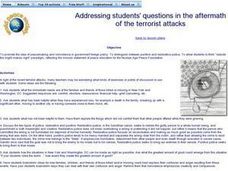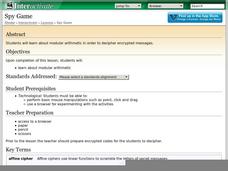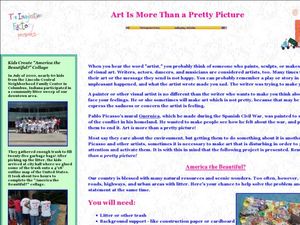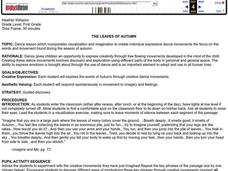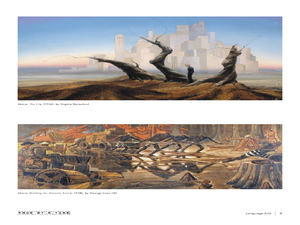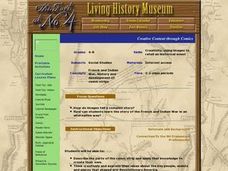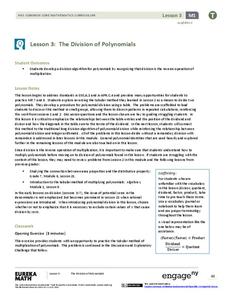Curated OER
Finding the dress code balance
High schoolers write a persuasive essay, expressing their opinions of how the school dress code should be changed. Students investigate their own school's dress code, developing their own opinions of whether the dress code should be more...
Curated OER
William Shakespeare's Julius Caesar: Fate Versus Free Will
Students relate legends of lucky objects such as a rabbit's foot and principles of Feng Shui to fate and free will concepts that are expressed in Shakespeare's play, "Julius Casear". In small groups, they redesign the palace of Casear to...
Curated OER
Using the Landscape Picture Map to Develop Social Studies Skills
Enhance your class' geography skills using this resource. Explore a variety of concepts including production and distribution, and people and the environment. Learners make predictions and identify locations on maps. This is a creative...
Curated OER
Addressing Student's Questions in the Aftermath of the Terrorist Attacks
Learners discuss peacemaking. In this political policy and emotions lesson, students explore ideas for expressing feelings in the aftermath of September 11, 2001. Learners reflect on punitive and restorative justice.
Shodor Education Foundation
Spy Game
Turn learners into detectives as they decipher encrypted messages. Introduce your class to modular arithmetic and have a little fun encrypting and decoding secret messages. The activity does not hit many content standards, but...
Curated OER
What Really Happened?
Sixth graders recreate scenes from the theories about the disappearance of Amelia Earhart. In this history and theatre instructional activity, 6th graders review the story of Earhart using a flip chart. Students work on one act plays to...
Curated OER
Gotta Dance!
Students explore how dance can invoke the significance of experiences in their everyday lives. They work in small dance troupes to create their own dance pieces reflecting themes and experiences relevant to their lives.
Curated OER
Art Is More Than Just a Pretty Picture
Students create unique art piece from litter. In this visual art lesson, students learn the importance of recycling and create a unique art piece. Students construct collages.
Curated OER
All About My School
Young scholars construct a website with several links to pages they create. The site weaves logo titles, photos, animation, and textured backgrounds created and edited in PhotoShop into pages created using Dreamweaver software. The...
Curated OER
Kente Cloth
Students attempt to research the history of using the kente cloth for its cultural purposes. They comment in discussion about the highly visual appeal of the cloths while going through the process of creating their own. The importance of...
Curated OER
Picture Perfect: Reading and Narrative Writing
Students will create a fictional narrative based on the cover of a picture book provided by the teacher. In this narrative writing lesson students incorporate all story elements and use strategies to engage the reader.
Curated OER
THE LEAVES OF AUTUMN
Dance gives children an opportunity to express creativity through free flowing movements developed in the mind of the child. Creating these dance movements involves discovery and exploration using different parts of the body in personal...
Curated OER
Creative Expressions: Phase Changes
Students place themselves in the position of a water molecule, ice molecule, or steam molecule and then describe the process of changing phase.
Curated OER
Art Analysis and Creative Writing
Students write an acrostic poem and analyze a work of art. In this art lesson plan, students look at a picture and answer questions about it, write a poem, write about the setting in the painting they saw, and answer short questions...
Curated OER
Creative Content through Comics
Students identify the different parts of a comic strip and creat their own about the French and Indian War period. They share their comics with the class. They can compile them into a newspaper format if they choose.
EngageNY
Comparing Methods—Long Division, Again?
Remember long division from fifth grade? Use the same algorithm to divide polynomials. Learners develop a strategy for dividing polynomials using what they remember from dividing whole numbers.
EngageNY
Replacing Letters with Numbers II
Teach about properties properly. Individuals investigate the commutative and identity properties for both addition and multiplication. They see that the properties hold true for all values by using substitution to test out several examples.
EngageNY
Simplifying Square Roots
Explore the process of simplifying square roots through an analysis of perfect squares. The fourth lesson of 25 expects individuals to find the perfect square factors in each radicand as a means of simplifying. The perfect square factor...
EngageNY
Putting It All Together
Shuffle 'em up and deal! Learners practice operations with polynomials using cards they pass around the room. The activity works with pairs or individuals, so it offers great flexibility. This is the fifth installment in a series of 42...
EngageNY
The Relationship of Division and Subtraction
See how division and subtraction go hand-in-hand. The fourth installment of a 36-part module has scholars investigate the relationship between subtraction and division. They learn using tape diagrams to see that they can use repeated...
EngageNY
Dividing by (x – a) and (x + a)
Patterns in math emerge from seemingly random places. Learners explore the patterns for factoring the sum and differences of perfect roots. Analyzing these patterns helps young mathematicians develop the polynomial identities.
EngageNY
Multiplying Polynomials
There's only one way to multiply, right? Not when it comes to polynomials. Reach each individual by incorporating various representations to multiplying polynomials. This lesson approaches multiplying polynomials from all angles. Build...
EngageNY
The Multiplication of Polynomials
If you can multiply multi-digit integers, you can multiply polynomials. Learners use an area model to compare multiplying numbers to multiplying polynomials. They progress to using the distributive property.
EngageNY
The Division of Polynomials
Build a true understanding of division of polynomials. Learners use their knowledge of multiplying polynomials to create an algorithm to divide polynomials. The area model of multiplication becomes the reverse tabular method of division.





